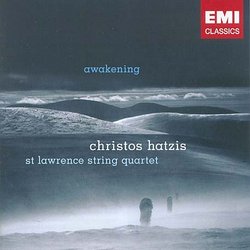Amazon.comBorn in Greece in 1953, Christos Hatzis now lives in Toronto and teaches at its University. These two string quartets, called "The Awakening" and "The Gathering," illustrate the multi-cultural influences on his life and music: his Byzantine heritage, "proto-Christian spirituality," tonal and modal elements, and American minimalism. In "The Awakening," he uses many sound effects, most prominently the rhythmic beat of railway locomotives that he heard in his childhood, and the chanting of the native Inuits of Canada, which he encountered after settling there. Both of these appear on sound-tracks that play along with the strings. He also employs harmonics, slides resembling the erhu, wails, whispers, slashing chords and sudden explosions. The music is harmonically and rhythmically rather static, with much motivic and thematic repetition; dynamics surge and recede, climaxes are carefully built up. Both quartets were inspired by external events or experiences: No. 1 by the clash of indigenous and mechanized cultures, becoming "a musical affirmation of faith in the Divine," and No. 2 by the conflict in the former Yugoslavia. The inclusion of Islamic, Middle-Eastern, and Eastern Orthodox elements reflects an "ongoing quest for a trans-national, trans-dogmatic view of the world" and "acts as a form of exorcism against the absurdity of war and senseless violence." Thus, calm, beautiful passages appear like oases amid the chaos, with melodies soaring up high, sometimes over agitated, multiple counterpoint. The St. Lawrence Quartet, tireless champions of living composers, commissioned "The Gathering" and have repeatedly demonstrated their uncanny ability to identify with alien idioms. They play these extraordinarily difficult works with consummate technical and tonal mastery and total emotional commitment. --Edith Eisler


 Track Listings (8) - Disc #1
Track Listings (8) - Disc #1